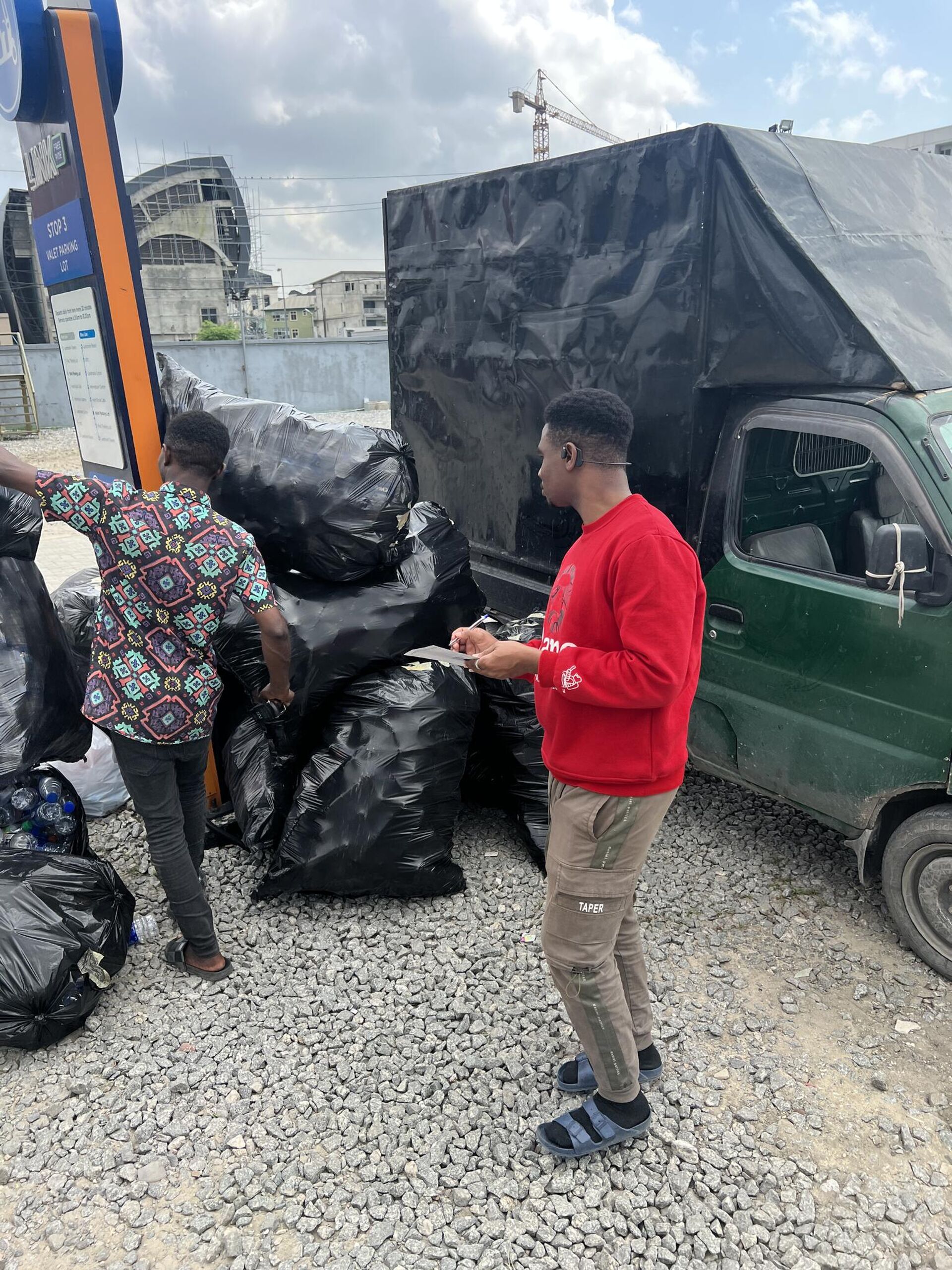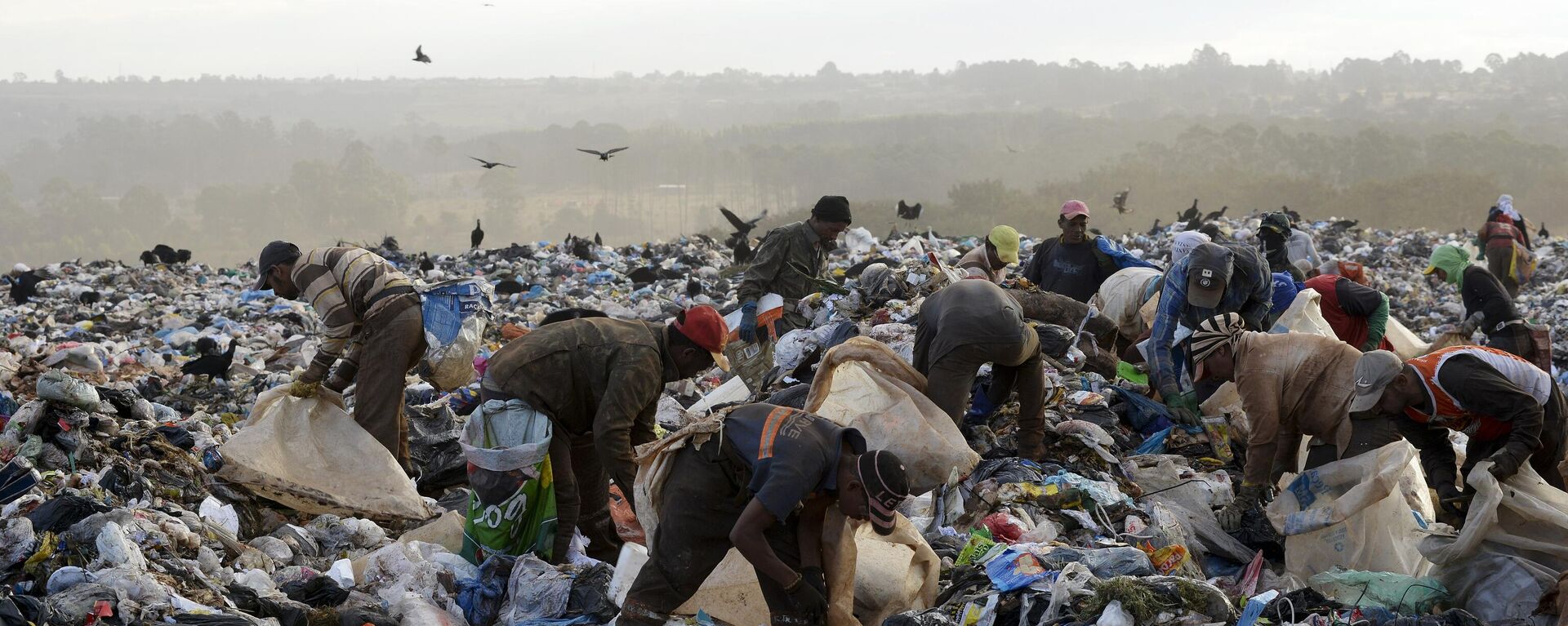https://en.sputniknews.africa/20240213/most-of-global-norths-waste-goes-to-africa-says-pollution-eradication-startup-ceo-1065062758.html
Most of Global North's Waste Goes to Africa, Says Pollution Eradication Startup CEO
Most of Global North's Waste Goes to Africa, Says Pollution Eradication Startup CEO
Sputnik Africa
Somalia recently banned the use of single-use plastic bags and called for environmentally friendly alternatives. The issue of plastic pollution is relevant to... 13.02.2024, Sputnik Africa
2024-02-13T15:19+0100
2024-02-13T15:19+0100
2024-02-14T09:56+0100
opinion
africa in details
nigeria
west africa
somalia
east africa
waste
waste dump
climate change
west
https://cdn1.img.sputniknews.africa/img/07e8/02/0d/1065063826_0:54:1024:630_1920x0_80_0_0_c418b6eec5c185cc994d6fda0f98b0ca.jpg
The majority of all types of waste from the Global North goes to Africa, which represents the phenomenon of "waste colonialism," Naphtali Obed, Founder and CEO of Climrenew, a pollution eradication startup, told Sputnik Africa.Obed noted that, statistically, about 20% of the world's plastic ends up in Africa and its dumping grounds, and cited a recent study that found that most of the source companies for plastic waste are in the Global North, for instance, Coca-Cola and Unilever.He explained that what causes "waste colonization" is the failure of African governments to ensure that organizations or countries responsible for pollution pay for what they have caused in terms of environmental degradation and in terms of other forms of "environmental injustice."In addition, the entrepreneur noted that most corporate plastic emitters in Africa shy away from extended producer responsibility and instead rely on corporate social responsibility, which is not controlled by regulatory policies or sanctions in case of failure.In addition to extended producer responsibility, the entrepreneur called for raising awareness of pollution in African communities and emphasized the importance of involving local communities, rather than global corporations, in solving local problems.In this vein, he wondered: "How do we ensure that these communities are being included in terms of decision-making and how best they can impact from whatever it is that the company is bringing to them."Continuing the theme of African efforts on fighting pollution, Obed praised the Somali government's initiative to ban the import, export, manufacture, trade and use of single-use plastic bags as of June 30 this year, calling it "a bold step in the right direction."What Does Climrenew Do?Naphtali Obed revealed that his Nigeria-based company, Climrenew, raises awareness and educates people about the effects of climate change, focusing on renewable energy, plastic, waste and sustainable agriculture.At the same time, his company conducts environmental cleanup exercises around plastic waste, the entrepreneur said, boasting that they were able to clean up to 35,000 PET bottles.The company engages communities, schools, students and volunteers in cleanup efforts, he added.
https://en.sputniknews.africa/20231222/transforming-waste-into-beauty-the-inspiring-journey-of-nigerias-favour-oluma-1064245832.html
https://en.sputniknews.africa/20231110/life-in-plastic-not-so-fantastic-activist-reveals-ways-to-reduce-plastic-waste-in-africa-1063455102.html
nigeria
west africa
somalia
east africa
west
Sputnik Africa
feedback@sputniknews.com
+74956456601
MIA „Rossiya Segodnya“
2024
Maxim Grishenkin
https://cdn1.img.sputniknews.africa/img/07e7/0a/17/1063018107_0:0:1104:1103_100x100_80_0_0_03090c85a11f5d2e8a19cf1d989443c9.jpg
Maxim Grishenkin
https://cdn1.img.sputniknews.africa/img/07e7/0a/17/1063018107_0:0:1104:1103_100x100_80_0_0_03090c85a11f5d2e8a19cf1d989443c9.jpg
News
en_EN
Sputnik Africa
feedback@sputniknews.com
+74956456601
MIA „Rossiya Segodnya“
Sputnik Africa
feedback@sputniknews.com
+74956456601
MIA „Rossiya Segodnya“
Maxim Grishenkin
https://cdn1.img.sputniknews.africa/img/07e7/0a/17/1063018107_0:0:1104:1103_100x100_80_0_0_03090c85a11f5d2e8a19cf1d989443c9.jpg
africa in details, nigeria, west africa, somalia, east africa, waste, waste dump, climate change, west, environment
africa in details, nigeria, west africa, somalia, east africa, waste, waste dump, climate change, west, environment
Most of Global North's Waste Goes to Africa, Says Pollution Eradication Startup CEO
15:19 13.02.2024 (Updated: 09:56 14.02.2024) Somalia recently banned the use of single-use plastic bags and called for environmentally friendly alternatives. The issue of plastic pollution is relevant to the African continent, with reports suggesting that enough plastic is thrown away or burned every minute in sub-Saharan Africa to fill a football field.
The majority of all types of waste from the Global North goes to Africa, which represents the phenomenon of "waste colonialism," Naphtali Obed, Founder and CEO of Climrenew, a pollution eradication startup, told Sputnik Africa.
"Waste colonialism has been a thing in the sense that most of this waste within the Global North is being shipped into Africa. You talk about electronic waste, you talk about other forms of waste, like even clothing. And this is simply because, sadly enough, Africa has become a dumping ground where some of these things end up," he lamented.
Obed noted that, statistically, about 20% of the world's
plastic ends up in Africa and its dumping grounds, and cited a recent study that found that most of the source companies for plastic waste are in the Global North, for instance, Coca-Cola and Unilever.
He explained that what causes "waste colonization" is the failure of African governments to ensure that organizations or countries responsible for pollution pay for what they have caused in terms of environmental degradation and in terms of other forms of "environmental injustice."
In addition, the entrepreneur noted that most corporate plastic emitters in Africa shy away from extended producer responsibility and instead rely on corporate social responsibility, which is not controlled by regulatory policies or sanctions in case of failure.
"The right thing would be the producer responsibility, which also ensures that there are policies that force most of these organizations to pay back for the damages they've caused [...] And I think that if this [is] incorporated in terms of most of these companies like I mentioned, Coca-Cola, Unilever and other forms of companies that heavily produce this plastic waste, then that can be controlled," Obed opined.
In addition to extended producer responsibility, the entrepreneur called for raising awareness of pollution in African communities and emphasized the importance of involving local communities, rather than global corporations, in solving local problems.
"One of the ways we think our voices are not being heard is because companies come mostly from the Global North, most of these heavy companies come to set up their facilities in our communities and they think that they know best on how to help us solve some of our problems," Obed said.
In this vein, he wondered: "How do we ensure that these communities are being included in terms of decision-making and how best they can impact from whatever it is that the company is bringing to them."
Continuing the theme of African efforts on fighting pollution, Obed praised the Somali government's initiative to ban the import, export, manufacture, trade and use of
single-use plastic bags as of June 30 this year, calling it "a bold step in the right direction."
"It's not the first African country to have implemented that. We have countries like Morocco, Kenya, Rwanda, but having the Somalian government to do this means it's in progression. And definitely other African countries will also come to light," he underlined.
Naphtali Obed revealed that his Nigeria-based company, Climrenew, raises awareness and educates people about the effects of
climate change, focusing on renewable energy, plastic, waste and sustainable agriculture.
At the same time, his company conducts environmental cleanup exercises around plastic waste, the entrepreneur said, boasting that they were able to clean up to 35,000 PET bottles.
"We are concentrating on PET bottles because that's most of the plastics you see around," Obed explained.
The company engages communities, schools, students and volunteers in cleanup efforts, he added.
"This is one of the ways to ensure that there's this behavioral change and making the communities aware of the impact of this plastic waste pollution and how they can be able to solve this. These issues around plastic waste, issues around climate change, it's something that even at individual level, affects us," Obed concluded.





